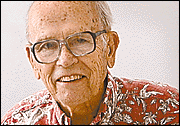


Hawaii’s World
HOW will you react if your physician says you are terminally ill? Most probably, after time to think about it, you: A better way to die
>> Won't want to be a burden on your loved ones.These reactions are common in the experience of Dr. Ira Byock, a recent lecturer here who has worked with hundreds of patients in Montana who have received such news.>> Will hope to avoid pain and indignity.
>> Will want to avoid being pauperized with treatment costs eating up dollars you want to leave to your heirs.
>> Would like assurance you won't die alone.
He is a former president of the American Academy of Hospice and Palliative Medicine, a prominent spokesperson for the hospice movement and author of "Dying Well." His appearance here, sponsored by The Queen's Medical Center and Hospice Hawaii at Home, drew an SRO audience of 300.
Byock has learned that dying does not have to be agonizing. Physical suffering can always be relieved, he says.
Then, when people are relatively comfortable and know they will not be abandoned, they frequently find ways to make dying a rich experience. They can strengthen bonds with those they love, forgive and make up with those with whom they have differed, and create moments of profound meaning in their final passage.
It happens in Hawaii often, thanks to our seven hospices, but not often enough. Only about 20 percent of terminal patients here seek hospice care.
That's better than the national figure of 15 percent, but still woefully low for two reasons. First, hospice love and care can help most dying persons, not a measly one-fifth.
Second, most people wait too late to turn to it. Several months at least of hospice care are desirable. These usually can be covered by insurance. Unfortunately most patients and/or their care-givers wait until just a week or so before the end to call a hospice.
Why do so few choose this humanitarian way to die?
The answer in a February article in Hawaii Medical Journal is many-faceted:
>> Too many physicians are underinformed.Surveys in Hawaii also have shown that most people would like the option of doctor-assisted death or suicide. But most physicians oppose it.>> Even those who are informed may not find time to discuss preferences in dying while the patient is still well. Even allowing that attitudes may change, the best time to start is while in good health.
>> Family conflicts often suppress full discussion of options. This can lead to overtreatment and expense to even try -- regardless of cost -- to save a doomed loved one. Their inevitable deaths are made unnecessarily painful and prolonged.
>> Religious and cultural factors. Surveys show that most people would prefer to die at home yet our deaths overwhelmingly take place in hospitals or nursing homes.
Dr. Byock is not for it but welcomes debate over it because it calls more attention to the inhumanity of the way we often handle dying.
A.A. Smyser, the Star-Bulletin's contributing editor,
passed away with dignity this morning.
A.A. Smyser is the contributing editor
and former editor of the the Star-Bulletin
His column runs Tuesday and Thursday.